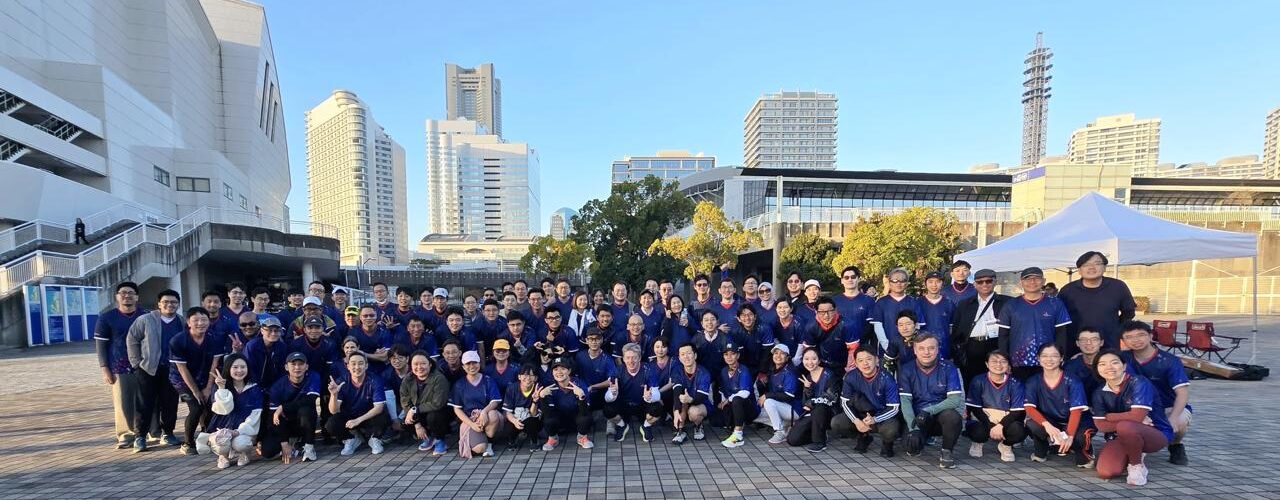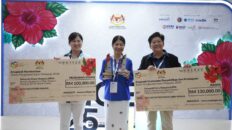Yokohama, 14 November 2025 – Today, the Asia Pacific Heart Rhythm Society (APHRS) officially launched the Yokohama Pulse Day Fun Run 2025 as the opening event of the Road to Pulse Day 2026 series. This activity marks the beginning of a global campaign to raise awareness about cardiac rhythm disorders or arrhythmias, and to encourage the public to maintain cardiac health through an active lifestyle and early detection.
The Yokohama Pulse Day Fun Run 2025, held in part of the APHRS Annual Scientific Sessions on 12- 15 November 2025, was chosen because it involves mass participation, promotes a healthy lifestyle, and reflects a strong sense of community spirit. This format is considered the most ideal way to demonstrate that cardiac health awareness belongs to everyone. A total of 120 participants of the APHRS Scientific Sessions took part in the fun run, consisting of cardiac rhythm enthusiasts from all around the world. Participants include members of APHRS and JHRS, as well as delegates from EHRA, HRS and LAHRS.
Dicky Armein Hanafy, MD, PhD, Head of Pulse Day Task Force, Chairperson of Public Affairs Committee Asia Pacific Heart Rhythm Society (APHRS), explained, “This event also held as the soft launch of Pulse Day 2026, following our previous press conference for the Road to Pulse Day 2026 held on November 6, 2025 in Jakarta. The activity reinforces the message that physical exercise, pulse checking, and heart disease prevention must go hand in hand. Participants will enjoy a morning run around the Rinko Park South Exit Plaza, visit various educational booths, and wear Pulse Day themed accessories to show their support for this global campaign.”
“As part of the APHRS Annual Scientific Sessions, in addition to the fun run, APHRS will host its annual scientific meetings and various related symposia. This reflects APHRS’s commitment to advancing arrhythmia care through scientific collaboration and knowledge exchange among its members and other national and international organizations. The scientific session features engaging lectures, highlights of the latest research in arrhythmia management, and hands-on, skill-based training through the APHRS Learning Village,” he explained.
Dr. Hanafy explained that last year, the campaign was led by the European Heart Rhythm Association (EHRA) in collaboration with the Asia Pacific Heart Rhythm Society (APHRS), the Heart Rhythm Society (HRS), and the Latin American Heart Rhythm Society (LAHRS). This year, the campaign will be spearheaded by APHRS together with its sister organizations to strengthen public understanding of arrhythmia, encourage people to “Feel The Pulse”, and promote preventive actions at both individual and community levels.
The Yokohama Fun Run 2025 is organized by APHRS in collaboration with the Japanese Heart Rhythm Society (JHRS). This collaboration demonstrates that awareness of cardiac health can grow through activities that engage the wider community.
“Through events like Fun Run, we want to encourage people to realize that maintaining a healthy heart rhythm is not only a medical matter, but also a lifestyle choice that starts with oneself,” said Dr. Hanafy.
Pulse Day is a global campaign commemorated every March 1 (1/3) as a reminder that one in three people may experience a significant cardiac arrhythmia in their lifetime. The campaign encourages people around the world to learn how to recognize and regularly check their pulse. To check your heart rate, place your index and middle fingers on your wrist or neck, count the beats for 30 seconds, and multiply by two to get your pulse in beats per minute. A normal resting heart rate ranges between 60 and 100 beats per minute.
Pulse Day 2026 will also be focused on raising awareness about Atrial Fibrillation (AF), one of the most common types of arrhythmias with a major impact on global public health. In the Asia-Pacific region, which is home to more than half of the world’s population, the incidence of AF continues to rise. Despite rapid advancements in medical technology, there remains a significant gap in access to comprehensive arrhythmia care.
Dr. Hanafy explained, “AF is known to increase the risk of stroke by up to five times and heart failure by up to three times, yet many cases remain undiagnosed, especially in regions that have limited resources. Through public education and community engagement, APHRS aims to make self-pulse checking a universal habit, a simple yet effective step for the early detection of AF, so that preventable complications do not become fatal.”
“The burden of cardiovascular disease and arrhythmia in the Asia-Pacific region continues to rise. Although there has been significant progress in health and technology, access to arrhythmia care remains very uneven. According to the APHRS White Book 2023, the number of life-saving procedures, such as catheter ablation and implantable cardioverter-defibrillator (ICD) implantation, in some countries is still hundreds of times lower than in developed nations. This situation shows as a crucial signal that joint strategies and sustainable health policies are needed to close this big gap,” explained Dr. Hanafy.
He explained that APHRS plays an active role in strengthening arrhythmia care capacity through regional training programs, research exchanges, and fellowship initiatives. These efforts have led to tangible progress, but APHRS recognizes that equitable access to care can only be achieved through the reform of sustainable policy, the expansion of trained medical professionals, and access improvement to the latest treatment technologies.
“We hope that health policies across Asian countries will continue to evolve sustainably, so that every patient, wherever they are, can receive immediate and high-quality cardiac care.” He added.
In addition, advances in technology have opened new opportunities for arrhythmia detection. Wearable devices and health applications equipped with heart rate monitoring features are now increasingly being used by the public. These tools can help detect heart rhythm abnormalities earlier and encourage faster medical consultation. They can also serve as useful companions for monitoring heart rate during physical activities, including sports such as running.
“However, APHRS emphasizes that professional medical assessment remains the most important. In line with the spirit of the Pulse Day campaign, APHRS continues to remind the public that manually checking our own pulse is a simple yet highly effective way to detect heart rhythm abnormalities earlier,” emphasized Dr. Hanafy.
“Throughout the Road to Pulse Day 2026 campaign, APHRS will inspire people to take an active role in maintaining their heart rhythm health. Through various educational forms, instructional videos, and expert guidance, APHRS aims to cultivate a simple yet life-saving habit, regularly checking our own pulse. The Yokohama Fun Run 2025 marks the symbolic beginning of this movement, celebrating cardiac health, fitness, and a spirit of togetherness for a healthier future for all,” he concluded.









